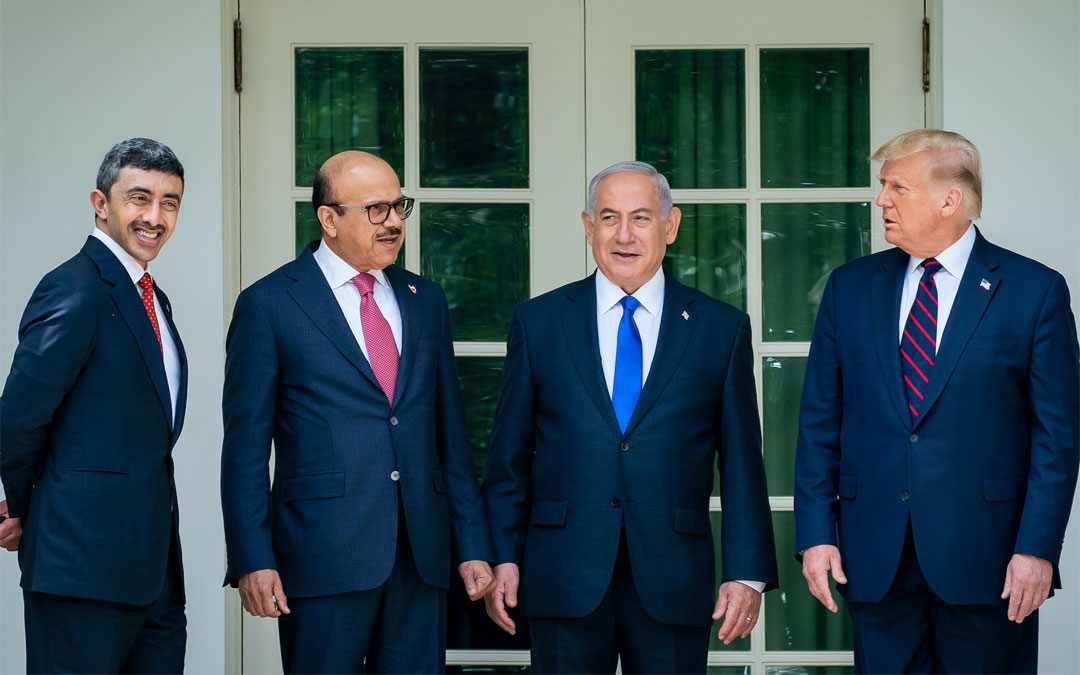What do the historic and groundbreaking Abraham Accords — which recently normalized relations between Israel, the United Arab Emirates and Bahrain — mean for diplomatic ties and business relations between the Jewish state and its neighbors in the Middle East?
On Wednesday, Jan. 27, at 11 a.m., the Maryland/Israel Development Center co-hosted a virtual program titled “The Abraham Peace Accords: A Catalyst for International Business with Israel, UAE, Bahrain and Beyond.” The program featured a panel of speakers from Israel, the UAE and Maryland, including Sen. Benjamin L. Cardin (D-Md.) and Jon Medved, founder and CEO of OurCrowd, a Jerusalem-based venture investment platform.

Jmore recently spoke with Medved, who was one of the first Israeli investors to conduct business in the UAE.
Jmore: You’ve been doing business with the UAE for more than a decade. How have the accords changed the landscape?
Medved: People need to realize that the Abraham Accords is not a peace treaty. Israel was never at war with any of these countries. It’s a normalization treaty.
Israel and the UAE have been doing business for over 30 years, but it’s been the worst kept secret in the Middle East,’ according to the New York Times. Now, thanks to the Abraham Accords, relations between the two countries are open and everybody’s involved.
Previously, working with the UAE involved crazy, circuitous work. It would take me over 20 hours — between travel and stopover time — to get to a country that was only three hours away.
But it wasn’t just that: you had to have a U.S. passport. You could never talk about your deal. I was once doing business with one of the largest mobile carriers in the UAE and was told by my lawyers that the [U.S. Securities and Exchange Commission] said we must reveal to them all the details of the deal. We were a bit nervous since there were no open relations between the UAE and Israel at the time, and we were afraid that would embarrass our customer.
The dropping of this barrier between us is akin to the Iron Curtain coming down. The ‘sand curtain’ is gone, and progress is simply unstoppable.
Now if you go to the UAE, the government is rolling out the red carpet for Israeli investors, enterprises and companies. And more importantly even than the government, it’s the people. The people are behind this. And that’s what makes this so unbelievable and special. When people there find out I’m from Israel, their response is, ‘Wonderful!’
How can Israel and the UAE work best together?
There’s a huge amount of synergy in a variety of areas between Israel and UAE. For instance, they are interested in food security. They want to grow more of their own food and become less dependent on imports. To do that, they need to learn more about agriculture — vertical agriculture, water agriculture, areas that Israel is strong in.
The UAE are leaders in logistics in terms of ports and trade. Israel is strong in areas like property technology, financial technology, health care and digital health. There are a broad range of activities that they can partner on.
What does this deal mean for future business between Israel and other Middle East countries?
This trend of Israelis doing business with the Arabs is an unstoppable trend. It’s wild and wonderful to be part of it.
The Abraham Accords affects so many areas: geopolitical, defense cooperation and business are a big part of it. The deal opens up the possibility of providing jobs for all the young people in our countries by building vibrant partnerships.
Innovation is the key to unlocking all of this. When you get these two countries with U.S. in between, the whole world will benefit from this.
Any other economic or relevant implications of the Abraham Accords?
There are strong geopolitical implications as these Arab countries and Israel build a broad front against the Iranians, which ultimately contributes to stability and protects against terrorism.
Do you feel that there will be other Arab or predominantly Muslim countries that will open relations with Israel in the near future?
Others will be joining. It’s happening as we speak. This is a game-changer. Israeli businesses can now reach markets that before were closed to them.
What I find most mind-blowing of all is that currently, the three countries with the highest vaccination rates are Israel, the UAE and Bahrain, the three countries involved in the Abraham Accords.
Until now, the Middle East was constantly associated with conflict and dispute. Now, these three countries are leading people out of this global crisis. People will have to get used to seeing more of this. No longer is the Middle East way down on the list, but it has been restored to what it was initially — a fountain of goodness for the world.
Will things change for the participants of the accords under the Biden administration?
No. In fact, I expect the U.S. to continue to broker future deals between Israel and other Arab countries.
Do you believe the accords will eventually help Israel reach an agreement with the Palestinians?
I think so. In business, you often learn you can get a lot more with honey than vinegar. People want to be working on something positive. They want positive reinforcement.
How will Maryland-based businesses and American investors benefit from the accords?
Maryland has huge activity in defense, cybersecurity and health care, especially pharma. All of these areas will benefit from the increased cooperation between Israel and the Gulf, and Maryland companies will help both sides make progress together.
How does this global development align with the goals of the MIDC?
MIDC is about creating and supporting economic activity between Israel and Maryland, who have huge common interests. As global development leads to further growth, this will help build Maryland-Israel ties.
“The Abraham Peace Accords: A Catalyst for International Business with Israel, UAE, Bahrain and Beyond” was co-hosted by the MIDC, Baker Donelson, OurCrowd and the International Network of U.S. and Binational-Israel Chambers of Commerce. The MIDC is a public-private partnership of the Maryland Department of Commerce, Israel’s Ministry of Economy and Trade and The Associated: Jewish Federation of Baltimore.
For information about the event, visit eventbrite.com/e/international-business-with-israel-uae-bahrain-and-beyond-registration-131114311435.
Hanni R. Werner is a local freelance writer.





